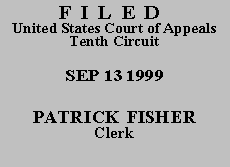

| NERO LEWIS TECUMSEH,
v.
GARY L. GIBSON |
|
Mr. Tecumseh, pro se, appeals the district court's order denying his petition for a writ of habeas corpus pursuant to 28 U.S.C. § 2254 and requests a certificate of appealability. We deny his request for a certificate of appealability pursuant to 28 U.S.C. § 2253(c) and dismiss the appeal.
On August 3, 1989, a jury convicted petitioner of various crimes in Atoka County District Court. Petitioner was sentenced on September 12, 1989, and the Oklahoma Court of Criminal Appeals affirmed both his conviction and sentence. Petitioner then filed a post-conviction appeal in the state trial court on September 20, 1996. The district court denied petitioner's application, and the court of criminal appeals affirmed the district court's denial on May 14, 1997. On April 20, 1998, petitioner filed a petition for writ of habeas corpus in the U.S. District Court for the Eastern District of Oklahoma. The district court denied petitioner's request for federal habeas corpus relief and petitioner's request for a certificate of appealability. Petitioner filed a timely notice of appeal and seeks a certificate of appealability from this court.
Petitioner argues first that the district court erred in finding his habeas petition time barred. He asserts that under the Antiterrorism and Effective Death Penalty Act ("AEDPA"), he had one year from the date his state post-conviction appeal became final, or until May 15, 1998, to file his federal habeas petition. We disagree.
The AEDPA provides that "[a] 1-year period of limitation shall apply to an application for a writ or habeas corpus by a person in custody pursuant to the judgment of a State court." 28 U.S.C. § 2244(d)(1). Generally, the limitation period begins to run on the date petitioner's conviction becomes final. See 28 U.S.C. § 2244(d)(1)(A). Because petitioner's conviction became final before the enactment of the AEDPA, his one-year limitation period began to run on April 24, 1996, the statute's effective date. See, e.g., Hoggro v. Boone, 150 F.3d 1223, 1226 (10th Cir. 1998). Petitioner did not file his federal habeas petition until April 20, 1998 -- well past the one-year limitations period.
However, we toll the period of time which petitioner spent properly pursuing state post-conviction relief. 28 U.S.C. § 2244(d)(2); Hoggro, 150 F.3d at 1226. Thus, we toll the limitations period from September 20, 1996 until May 14, 1997, the time during which petitioner's application for post-conviction relief in the Oklahoma state courts was pending. Therefore, petitioner had 236 days from May 14, 1997, or until January 5, 1998, to file his federal habeas petition. Because he did not file the petition until April 20, 1998, he is time barred from seeking habeas corpus relief. Moreover, the facts contained in the record do not support equitably tolling the AEDPA limitations period.
Petitioner further argues that the district court erred in failing to hold a hearing as required by either Rule 8 of the Rules Governing Section 2254 Cases or 28 U.S.C. § 2243. We disagree. Rule 8(a) provides for an evidentiary hearing only if the petition has not been dismissed at a previous stage in the proceedings. In this case, the district court dismissed the petition early in the proceedings because it was clear from the face of the petition that it was time barred. Similarly, under 28 U.S.C. § 2243, the district court is not required to hold a hearing on an application for post-conviction relief if "it appears from the application that the applicant or person detained is not entitled thereto." In petitioner's case, there was no question that his application was time barred. Accordingly, the district court did not err in failing to hold a hearing under either Rule 8 or 28 U.S.C. § 2243.
Finally, petitioner contends that the district court erred because it failed to notify him that he could object to respondent's motion to dismiss and did not order him to file a reply. However, the district court had no duty to so inform petitioner, and there is no basis for habeas relief on this ground.
On July 22, 1999, Petitioner filed a motion in this court to file a supplemental appeal brief. We grant petitioner's motion.
We conclude that petitioner has failed to make a "substantial showing of the denial of a constitutional right," as required under 28 U.S.C. § 2253(c). Accordingly, we deny his application for a certificate of appealability.
This appeal is DISMISSED.
ENTERED FOR THE COURT,
Deanell Reece Tacha
Circuit Judge
*.This order and judgment is not binding precedent, except under the doctrines of law of the case, res judicata, and collateral estoppel. This court generally disfavors the citation of orders and judgments; nevertheless, an order and judgment may be cited under the terms and conditions of 10th Cir. R. 36.3.